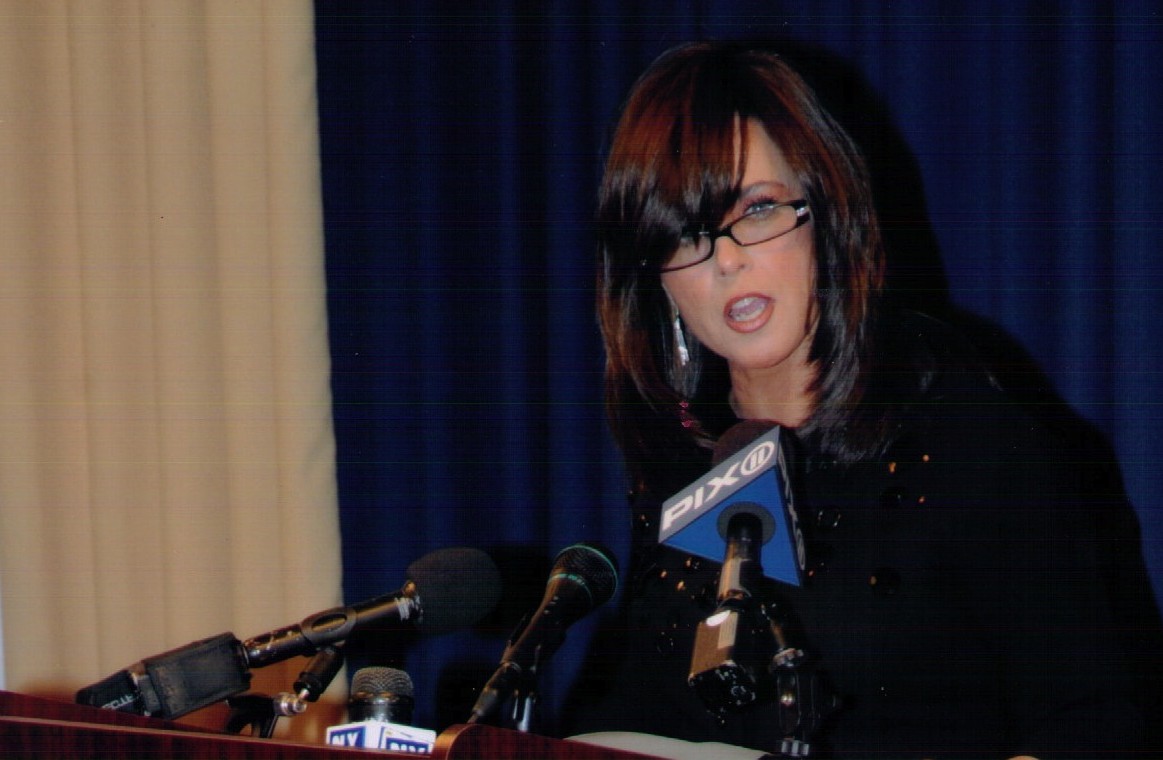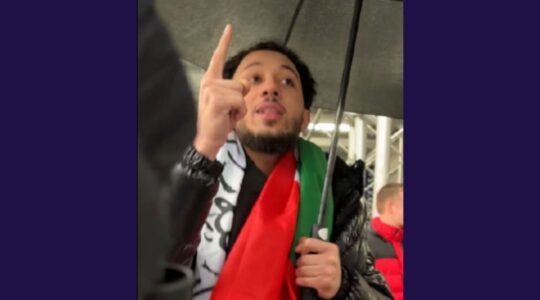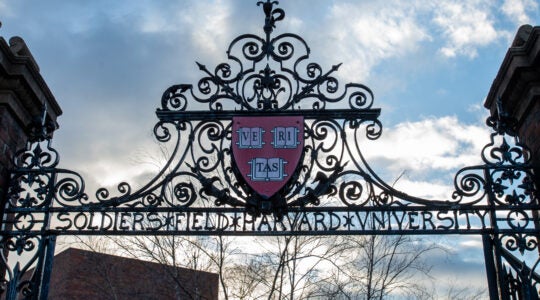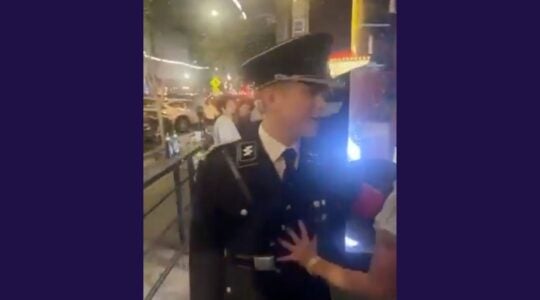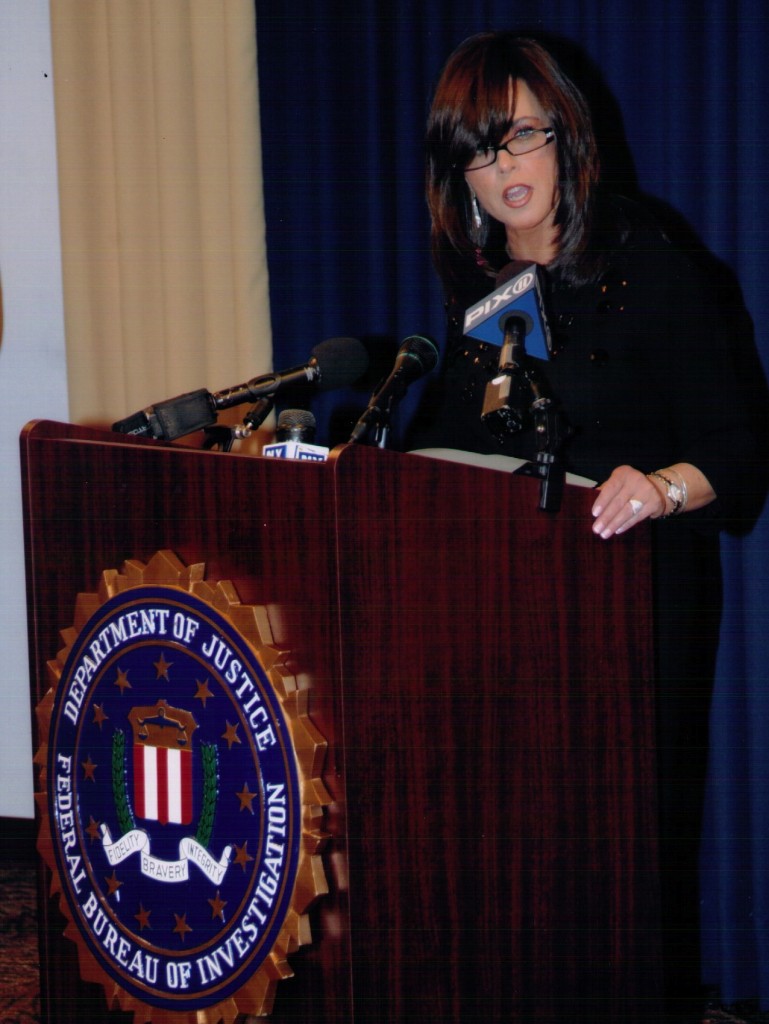
Devorah Halberstam receives the 2009 community leadership award from the FBI, which calls her a “vital asset in our fight against terrorism.” (Courtesy of Devorah Halberstam)
NEW YORK (JTA) – When a 16-year-old Lubavitcher named Ari Halberstam was gunned down on the Brooklyn Bridge on March 1, 1994 by a Lebanese livery cab driver, the killing seemed to be a cut-and-dried case.
The shooter, Rashid Baz, was captured the following day and confessed to police. After a trial several months later, he was sentenced to 141 years in prison.
But a murder conviction was not enough for Ari’s mother, Devorah Halberstam. She saw a terrorist conspiracy behind the shooting and criticized authorities for treating it as an ordinary homicide.
For years she obsessively campaigned for further investigation, clamoring to be taken seriously by authorities. She waited on receiving lines to buttonhole senators and congressmen, knocked on doors at City Hall, and traveled back and forth to Washington.
Twenty years after her son’s killing, Halberstam is now an authority on terrorism with close ties to law enforcement officials — a highly unusual role for a Hasidic woman.
“In the beginning I was only a hysterical mother, without a doubt,” Halberstam told JTA in an interview at her Brooklyn home. “Today I am included by law enforcement. I am part of them.”
She regularly helps train security officials on terrorism-related issues, giving seminars to police and FBI agents, flying to Army bases to lecture soldiers, teaching Border Patrol agents and meeting with security officials from overseas.
Last week, a man who tried to build a pipe bomb for use in New York, Jose Pimentel, was sentenced to 16 years in prison on terrorism charges under laws that Halberstam helped to draft.
“If I had to use one word to describe Devorah, I would use the word relentless,” Raymond Kelly, who served as the commissioner of the New York Police Department from 1992 to 1994 and again from 2000 to 2013, told JTA. “She’s a major force in the political world, and certainly those people who focus on the issues of counterterrorism know that well.”
Halberstam acknowledges that she never could have imagined this life for herself two decades ago. Back then it was all about achieving a measure of justice for her son.
Halberstam’s campaign, which focused on having her son’s shooting recognized as a terrorist act, wasn’t merely semantic. To her, the issue cut to the heart of what she saw as the authorities’ failure to fully pursue other avenues of investigation: Who helped inspire the attack, plan it, abet it and conspire to shelter Baz in the hours after the shooting?
On the surface, the attack appeared to be an Arab gunman’s angry response to the massacre in Hebron several days earlier, when 29 Palestinians were gunned down by Baruch Goldstein, a West Bank settler.
The young Halberstam had been a passenger in a van full of Hasidic boys that was trailing the motorcade of the Lubavitcher rebbe, Menachem Mendel Schneerson, on a trip home from the hospital for eye surgery. Halberstam believes the van became a Jewish target of convenience once the rebbe’s vehicle disappeared into a tunnel.
In the condolence letter that President Clinton wrote to the family, he pledged his “commitment to deal with the hatred and criminality that caused your son’s death.”
LISTEN: Devorah Halberstam speaks with Uriel Heilman about her son Ari.
But the lawyer for Baz, who had an arsenal of weapons with him that day, maintained the shooting was the result of a traffic dispute carried out by a lone assailant without assistance. No official motive was determined at the trial.
Halberstam wanted more. She worked to collect letters of support from powerful politicians, got a Brooklyn Bridge ramp named for her son and raised millions of dollars for the construction of a Jewish children’s museum in the Crown Heights section of Brooklyn dedicated to Ari’s memory. She sued the companies that manufactured the guns used in her son’s killing (and lost). She pushed the state to pass Ari’s Law, which requires a license to possess a gun kit and is meant to curtail interstate gun trafficking.
All the while, her son’s case remained closed.
The turning point came in 1999, when media reports about the case sparked renewed calls by New York’s governor, U.S. senators and congressmen for a reassessment. The FBI finally responded, describing the shooting as an act of “road rage.”
The imprudence of the designation ultimately led to Halberstam’s triumph: Under public pressure, the FBI assigned an agent in May 1999 to review the case, and in December 2000 the agency officially conceded that the shooting indeed had been an act of terrorism.
But Halberstam’s campaign was not over.
She kept pushing for the investigation of unfollowed leads, arguing that counterterrorism required a different approach to law enforcement. In June 2000, New York’s then governor, George Pataki, appointed her to serve on the state’s first Commission on Terrorism. For Halberstam, the idea wasn’t just to make sure that those who aided Baz were punished — though it was that, too. Hers was a campaign to have authorities deal differently with terrorist crimes, to scrutinize the milieu from which terrorists came, map their networks and monitor their associates.
“Now we can clearly see that it was part of a whole pattern of terrorist activity that keeps repeating itself,” former New York City Mayor Rudy Giuliani said in 2009 of the Halberstam shooting.
After the attacks of Sept. 11, 2001, that kind of aggressive, holistic approach to terrorist crimes suddenly didn’t seem like a paranoid overreaction. In the ensuing years, close, ongoing scrutiny became de rigueur, as the trove of revelations from Edward Snowden has made clear.
“In a way, the attacks of 9/11 have really validated her position and given her increased credibility,” Kelly said of Halberstam. “Her stressing this issue before 9/11 was important, but clearly the horrific events of 9/11 really galvanized the law enforcement community, and she’s been a player in it.”
Halberstam’s own public profile changed in tandem with the new prioritization of counterterrorism. In 2009, in a sign of how dramatically Halberstam had gone from victim to authority, she received a community leadership award from the office of the FBI director, which hailed her as a “vital asset in our fight against terrorism.”
“She has become an expert on the topic of terrorism, and is well versed as to the various terrorist entities such as Hamas, Hezbollah and al-Qaida, to name just a few,” Joseph Demarest, assistant director of the FBI’s Cyber Division, told JTA. “She has truly taken, one could argue, the most horrific event — losing a child — and used it as a catalyst for good.”
Over the years, Halberstam also found validation of some of her suspicions in Ari’s case.
In 2007, Baz in a confession corroborated Halberstam’s longtime contention that his real target had been the Lubavitcher rebbe. Last year, the Palestinian uncle who Halberstam long had claimed provided Baz with the weapons he used in the shooting was arrested for allegedly being part of a multistate cigarette-smuggling ring with terrorist ties.
Today, Halberstam isn’t only concerned with terrorism. She organizes meetings in Crown Heights to help tamp down tensions between blacks and Jews, including after the spate of “knockout attacks” in Brooklyn last fall. She continues to raise money for the Jewish Children’s Museum, where many of her community encounter programs take place and which sits across the street from Lubavitch world headquarters at 770 Eastern Parkway.
Lately, she’s also been trying to organize a conference on protecting the homeland in the age of terrorism. And she spends time, when she can, with her grandchildren, three of whom are named for Ari.
What drives her to do all this, Halberstam says, isn’t just justice. It’s about trying to make sure other mothers don’t have to endure the loss and pain that was thrust upon her 20 years ago — and remains with her every day, still.
“I feel like I have an obligation to my child,” she said. “Somebody else stole his life. And I don’t think just somebody else; it’s a system that was in place. And I believe no matter how long it will take, I will not stop.
“It’s like breaking up a gang, and we have to fight this. I don’t know if I’ll see it in my lifetime, but I sure as hell am going to continue doing it until the day I die, as long as I live on this earth.”
JTA has documented Jewish history in real-time for over a century. Keep our journalism strong by joining us in supporting independent, award-winning reporting.
